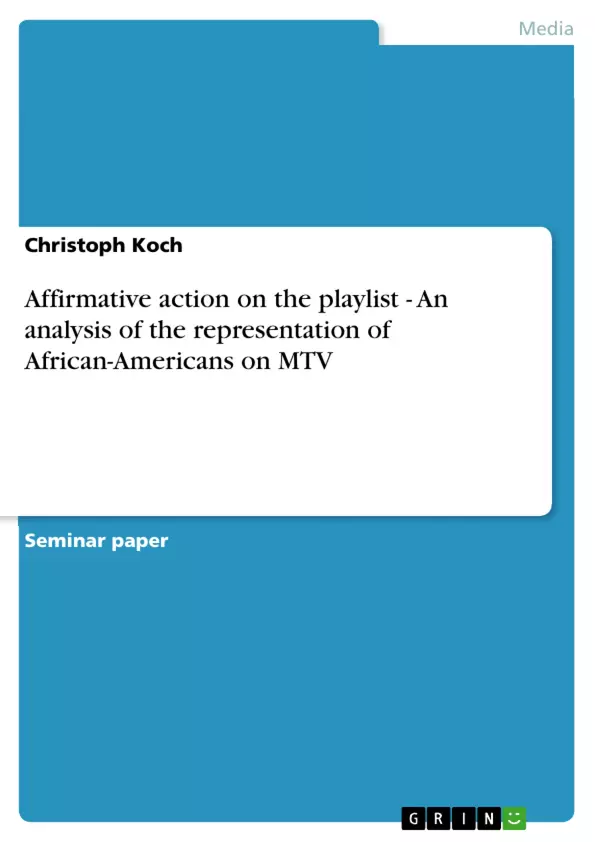MTV – an “all encompassing mediator of popular culture” (Goodwin, 1992) or as the Washington Post once put it “perhaps the most influential single cultural product of the [eighties]” (McGrath 1996, p. 8). A trademark that has become a synonym for modern television, fast moving pictures and even a certain lifestyle. ‘MTV generation’, ‘MTV-like’, ‘I want my MTV’ etc. But MTV is more than entertainment for teenagers and music with colorful pictures around it – It is not only the world’s fastest growing network but also a powerful gatekeeper. Whoever makes it onto the playlist of the network can expect their CD sales to skyrocket and his concerts to be sold out. But the question is, is MTV giving everybody the same chance?
This research paper deals with the question of how black people are represented in the music programming of MTV. Although MTV today features more game, quiz and celebrity shows and less music videos than it did in the 1980s, it can still be considered ‘Music Television’ and has 50 different titles in rotation each week.
To find out more about the representation of African-Americans on MTV, the following hypotheses will be tested:
H1: The percentage of black artists on MTV’s playlist has increased significantly over the last decade with a particular strong increase in the middle of the 1990s.
H2: The percentage of other minorities (like Asians, Hispanics, etc.) in contrast has not increased over the last 10 years.
H3: The percentage of black artists on MTV’s playlist is higher in February (Black History Month) than in another random month.
In the first chapters, however, MTV’s history will be briefly examined as well as its role as a strong gatekeeper in the music industry. Additionally, the big controversy that took place in the early years of MTV, when several black artists protested the network’s “impenetrable racial barrier” (Idowu 1999, p. 41) will be talked about.
Inhaltsverzeichnis (Table of Contents)
- Introduction
- The History of MTV
- MTV as a Powerful Gatekeeper
- The Racism Debate of the 80s
- Analysis of MTV's playlist from 1989 to 1999
- Methods
- Results Hypothesis 1
- Results Hypothesis 2
- Results Hypothesis 3
- Conclusion and Questions for Future Research
Zielsetzung und Themenschwerpunkte (Objectives and Key Themes)
This research paper investigates the representation of African-Americans on MTV's music programming. It aims to determine whether black artists have been given equal opportunity on the network's playlist, and explores how their representation has changed over time. The study uses a specific timeframe of 1989 to 1999 to assess this issue.
- The role of MTV as a gatekeeper in the music industry
- The historical debate surrounding MTV's representation of black artists
- The evolution of African-American representation on MTV's playlist from 1989 to 1999
- The impact of MTV's playlist on the success of artists
- The potential biases and limitations of MTV's programming
Zusammenfassung der Kapitel (Chapter Summaries)
- Introduction: This chapter introduces the research topic, highlighting MTV's significant role in popular culture and its influence on the music industry. The study outlines three specific hypotheses that will be tested to analyze the representation of African-Americans on MTV's playlist.
- The History of MTV: This chapter provides an overview of MTV's development, from its launch in 1981 to its growth in the 1980s. It discusses the impact of key events, such as the "I want my MTV" campaign and the launch of VH-1, on the network's success and influence.
- MTV as a Powerful Gatekeeper: This chapter examines MTV's influence on the music industry, emphasizing its role as a powerful gatekeeper that can determine the success of artists. It discusses how MTV's playlist can significantly impact an artist's career, highlighting the importance of representation on the network.
- The Racism Debate of the 80s: This chapter delves into the controversies surrounding MTV's representation of black artists in the 1980s. It explores the arguments and criticisms made against the network, particularly regarding the lack of inclusion and the perceived "impenetrable racial barrier."
Schlüsselwörter (Keywords)
The core concepts of this research paper revolve around the representation of African-Americans on MTV's playlist, with specific emphasis on music programming, gatekeeping, and the historical and contemporary debates surrounding racial inclusion in media. The study analyzes the impact of MTV's playlist on the success of artists, explores the evolution of African-American representation over time, and delves into potential biases in the network's programming.
Frequently Asked Questions
Was MTV biased against black artists in its early years?
The research discusses the "racism debate" of the 1980s, where MTV was accused of having an "impenetrable racial barrier" before artists like Michael Jackson broke through.
How did the representation of African-Americans on MTV change from 1989 to 1999?
The study tests the hypothesis that the percentage of black artists on MTV's playlist increased significantly during the 1990s.
Does "Black History Month" affect MTV's programming?
The paper investigates whether the percentage of black artists is higher in February compared to other months.
Why is MTV considered a "gatekeeper"?
As a powerful network, MTV's playlist decisions could determine whether an artist's CD sales skyrocketed or their concerts sold out.
How are other minorities represented on MTV?
The research also examines whether the representation of other groups, such as Asians or Hispanics, increased alongside that of African-Americans.
- Citation du texte
- Christoph Koch (Auteur), 1999, Affirmative action on the playlist - An analysis of the representation of African-Americans on MTV, Munich, GRIN Verlag, https://www.grin.com/document/3943



